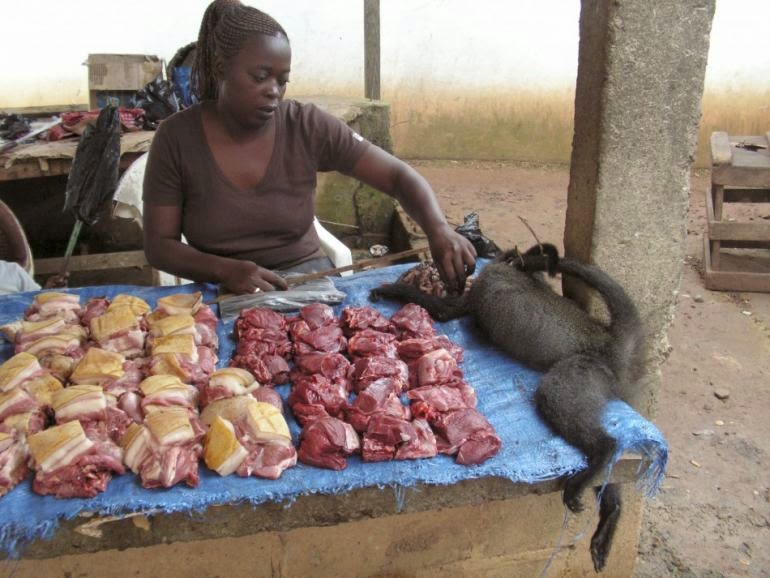Stay off bush meat; Health experts advise
By Edmund Smith-Asante
Health
experts have advised patrons of bush meat to stay off them for a while in order
to prevent any Ebola infection.
“Avoid
contact with bush meat as much as possible. If you have handled it, make sure
that you are protected. It is more likely for a person to get the virus when
dissecting the meat,” an official from the Ghana Health Service (GHS), Mr
Michael Adjabeng said.
This was
in response to a question on what temperature was adequate for cooking an
animal in order to ensure its safety for consumption.
According
to Mr Adjabeng, although not all bats had the virus, the bat was the natural
reservoir for the Ebola virus. He added that when all other animals are infected
with the virus, they would die from it, just like humans, which meant they
could infect anyone if they had the virus.
In
response to whether there were fruits that should not be eaten because fruit
bats may have touched them, he said, “if you see a fruit in the forest and you
are not sure who bit it, don’t go near it.”
Bats at
37 Hospital
Also
answering a question on the steps taken to ensure that the fruit bats at the 37
Military Hospital did not infect anyone through their droppings, the Deputy
Minister of Health, Dr Victor Asare Bampoe, said it had not been ascertained
that they were carriers of the virus.
He,
however, cautioned that anyone who got some of their droppings on their cars
should carefully and thoroughly wash them off with the necessary detergents.
Dr Bampoe
also said the virus had to live inside a cell and that if they were exposed to
sunlight, they became inactive.
Dr Kofi
Bonney of the Noguchi Memorial Institute of Medical Research said “a virus can
only grow inside a cell”, which meant that if it got into a human or animal’s
body, it entered a cell and started multiplying.
“For
Ebola, research has shown that it takes three to four days for it to exist
outside a body cell,” after which it became inactive, especially in the
sun, he said.
Rural and
children sensitisation
On
educating people living in rural areas on the virus, the Public Relations
Officer of the Ghana Health Service, Mrs Rebecca Ackwonu, said the service was
embarking on community education.
“There
are health promotion officers in the regions who do advocacy. They also engage
opinion leaders and chiefs as well as religious bodies,” she said.
Regarding
the visually and hearing impaired, she said audio and video recordings would be
sent to their schools and sign language would be incorporated when the video
was shown on television.
“The
production of braille for the visually impaired also came up at the education
sub-committee meeting,” she stated.
Answering
a question on the Korle-Bu Teaching Hospital’s preparedness, the deputy health
minister said, “I think the responsibility for us is to make sure that the
rhetoric reality gap is closed.
He
indicated that guidelines and recommendations had already been given for health
facilities to put in place isolation centres to do some of the things they
would do in readiness for Ebola. He promised that the health ministry would
make sure that through the Ghana Health Service hierarchy, the hospitals did
what was expected of them.
Writer’s
email: Edmund.Asante@graphic.com.gh
This was first published by the Daily Graphic on
August 21, 2014




Comments
Post a Comment